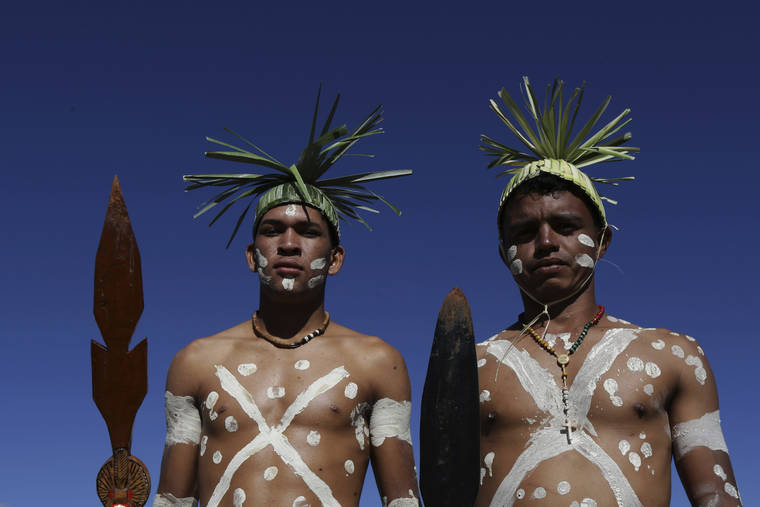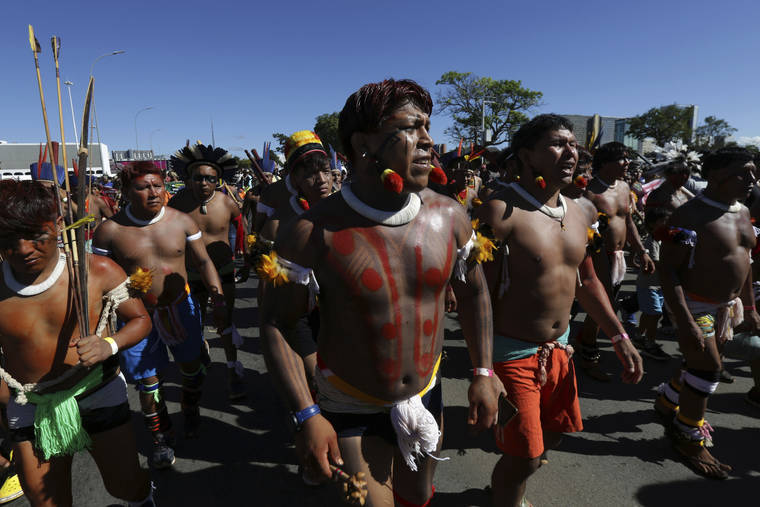BRASILIA, Brazil — Thousands of indigenous Brazilians danced, sang and performed traditional rituals using maracas and smoke pipes during a march Friday to protest the pro-business agenda of far-right President Jair Bolsonaro.
The march, attended by native leaders from over 300 ethnicities across Brazil, is part of a three-day annual event known as the Free Land Encampment.
“We are not afraid, our motto is ‘People united will never be defeated,’” said Marizete de Souza, regional coordinator of the Macuxi people. “Let Bolsonaro’s government come because he won’t be able to do what he wants with our indigenous lands in Brazil. Because we are warriors.”
This year, the campout focused its message on Bolsonaro’s decision to move the agency supervising indigenous affairs to the Agriculture Ministry and a new ministry for family, women and human rights led by an ultraconservative evangelical pastor.
The agency known as FUNAI is in charge of designating indigenous land and of granting environmental licenses to businesses on indigenous reserves. It was previously attached to the Justice Ministry.
Critics say the move will facilitate the expansion of mining and industrial farming businesses on protected areas.
Earlier this week, lower house Speaker Rodrigo Maia said he would push to revoke the changes to FUNAI when the proposals come up for debate in Congress.
Pushback over Bolsonaro’s stance toward indigenous rights also comes amid an ongoing struggle to rein in illegal logging in the country’s Amazon region.
More than 600 European scientists signed a letter Friday asking that trade negotiations between Brazil and the European Union be based on sustainable principles.
“We urge the EU to seize this critical opportunity to ensure that Brazil protects human rights and the environment,” read the letter published in the online edition of Science magazine. “By working toward dismantling anti-deforestation policies, Brazil’s new administration threatens Indigenous rights and the natural areas they protect.”
Scientists said the EU spent more than 3 billion euros ($3.3 billion) in 2017 on Brazilian iron imports in spite of “extensive deforestation driven by mining,” and that in 2001 it imported beef and livestock feed linked to the illegal logging of more than 1.000 square kilometers (386 square miles).
The letter was also signed by two Brazilian indigenous organizations representing 300 communities.
The Deforestation Alert System, which monitors illicit harvesting in the Amazon, has reported a 24% increase in deforestation in the region between August 2018 and March 2019, compared to the same period the year prior. Over those eight-months, the watchdog said 1,974 square kilometers (760 square miles) of trees and vegetation were destroyed.
During his campaign, Bolsonaro said he would not give “one more centimeter” of land to indigenous groups if elected. He also compared indigenous people living on reserves to caged animals in zoos.
At Friday’s march, participants walked down Brasilia’s main avenue and stopped to protest in front of the justice and health ministries. Ten indigenous leaders met with Justice Minister Sergio Moro’s chief of staff, demanding that FUNAI be reinstated under its supervision.
After the meeting, Marcos Xukuru, chief of the Xukuru people in the state of Pernambuco, told reporters the ministry seemed open to dialogue.
Three women outside the building held a banner that read: “Indigenous blood: not one more drop.”
Dozens of police vehicles, members of the cavalry, a helicopter and armored trucks monitored the peaceful protest which ended in front of Congress.
In a similar gathering in 2017, police shot tear gas at indigenous protesters who fired back with bows and arrows.
The three-day encampment is ending Friday night.
———
Associated Press video journalist Renato Domingues reported this story from Brasilia and AP writer Diane Jeantet reported from Rio de Janeiro. AP video journalist Mia Alberti in Brasilia contributed.



